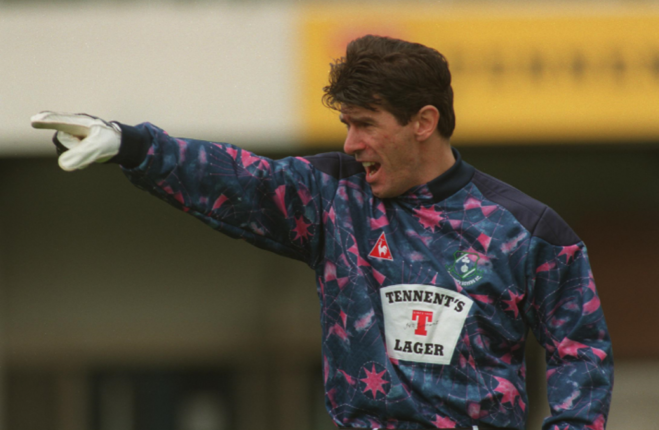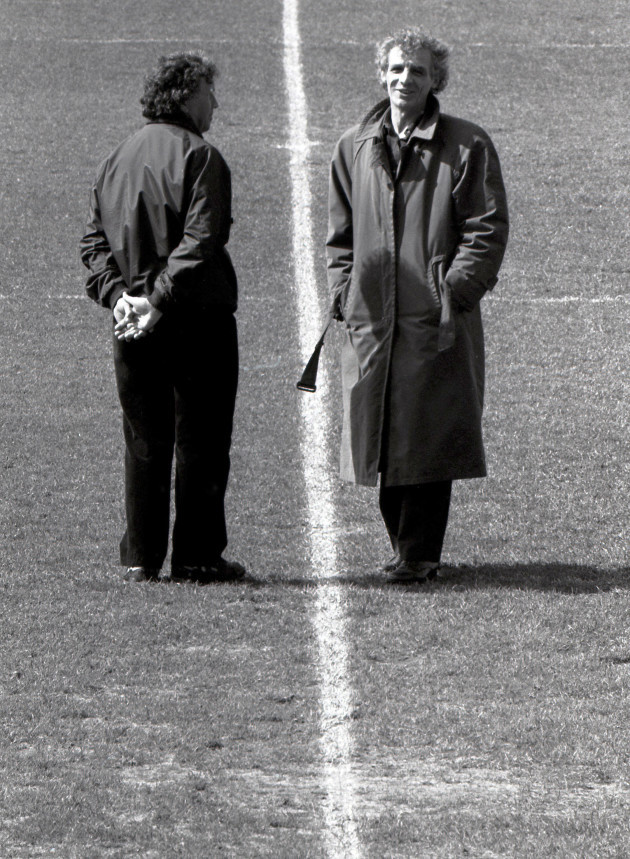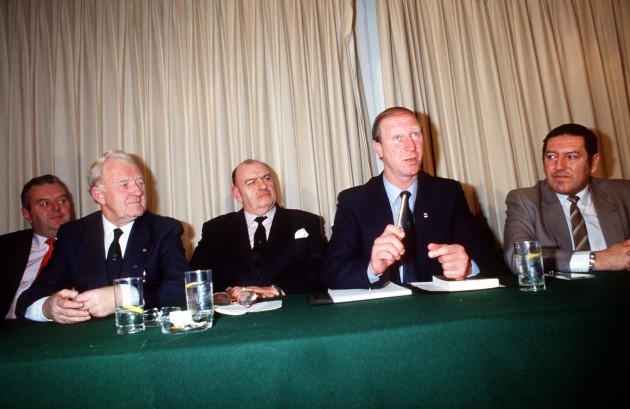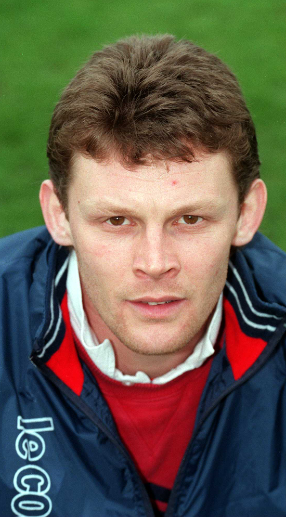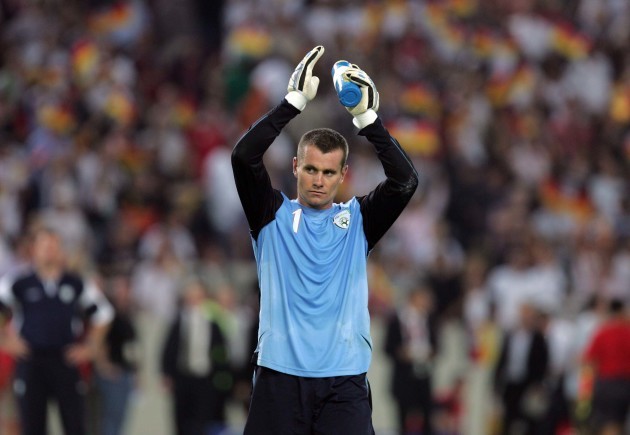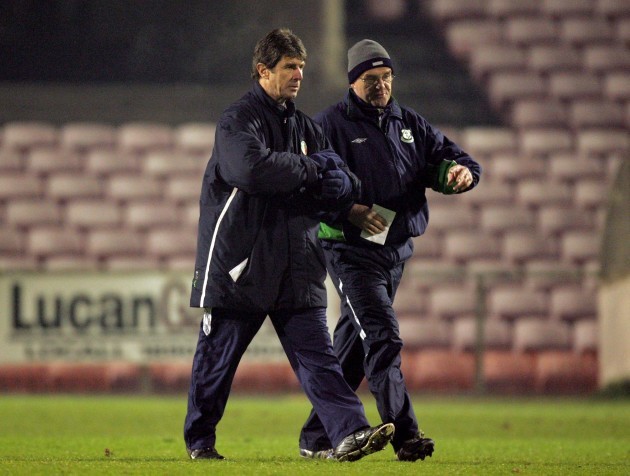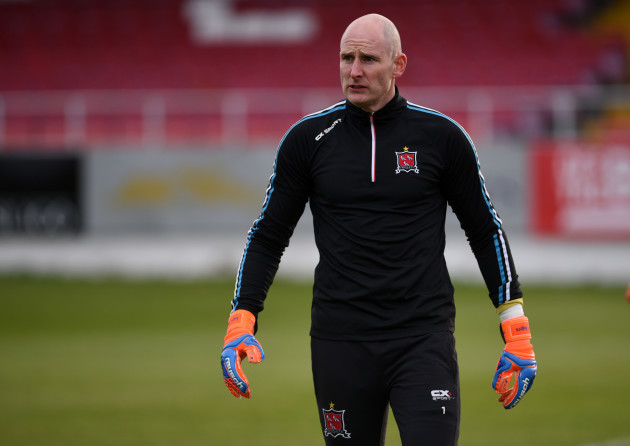IT’S RARE FOR a League of Ireland player to get called up to the Irish national squad.
It’s even rarer for that to happen under four different managers without the said player featuring in the single game.
Yet that was one of the many intriguing quirks of fate over the course of Alan O’Neill’s storied career.
The former Dundalk and Shamrock Rovers star held the record for most games of any goalkeeper in the League of Ireland until Gary Rogers passed him out last season and is currently fifth on the all-time appearances list.
Looking at it from the outside, it might have seemed as if O’Neill was destined for a career in sport given his family background. His father Robert played briefly for Shelbourne, but mainly stuck to junior football and was also goalkeeper for Dublin GAA for a period in the 1940s. His younger brother Dermot also had a good career in the League of Ireland, making over 200 appearances for Bohemians during the 1990s.
O’Neill himself started out around the age of 10 as an out-field player for local side Bonnybrook Boys.
I got this fella a bit of publicity down through the years — it was a Scottish lad who played in goal. It was around the time of the home internationals. We used to play on Saturdays and England were playing Scotland one Saturday, and he never showed up, because he wanted to see the home international match. As a result, I went in goal and never got out.
“I always wanted to play in goal, don’t get me wrong, but that’s how I started competitively.”
O’Neill could so easily have followed in his father’s footsteps in another sense, given that he quit soccer to play GAA for a few years.
“That was a big grounding for me, because we had a Christian brother in charge of the team — a super coach, he was way ahead of his time. We used to train after school. I was 12 or 13. At break time, when everyone went into the yard, we went into his classroom for tactical talks.
“If you wanted to be the best, and we were at that school level, it demanded huge application and training.
“I realised how hard you had to work to make something of your career. Even the psychology of the man. I remember we were training for a schools final in Croke Park. That was usually around January. The snow was on the ground. After school we arrived up and thought ‘there’s no way we’re going to be training today’. He duly made us get out and train. He came in afterwards and said: ‘We were training today. I bet you [our rivals] aren’t. We’ll have one up on them.’”
A few years later, O’Neill returned to soccer and played for St Malachy’s. An avid viewer of Match of the Day, moving to play in England was always an ambition, but the opportunity never came about.
“As a goalkeeper, I was barely six foot, and unless you were 6’2 or 6’3, they weren’t interested.”
The former Ireland manager Liam Tuohy lived nearby to where Malachy’s would play. He recommended O’Neill to the scout and former Dundalk player Shay Noonan, with the youngster joining Shamrock Rovers shortly thereafter.
“I was a Rovers supporter from the Northside. In those days, you used to get Football Specials from Hawkins House out to Milltown.
“Rovers were huge at the time. You had the six-in-a-row cup team. Mick Leech, Frank O’Neill, they were all household names. To even see them train was huge. So it was a big thrill for me to sign.”
An injury to regular first-team goalkeeper Pat Dunne saw a teenage O’Neill make his debut in 1975, amid a 1-0 win over Cork Hibs.
Still raw and prone to mistakes, he was largely deployed as back-up goalkeeper initially.
I won the League Cup in ’76 under Seán Thomas against Sligo Rovers at Dalymount Park. Around that time, Ireland played England at Wembley. Pat went over for the match. There were storms on the way back and he didn’t get back in time to play. The first game was against Dundalk. I got in, did well, Seán was a bit peeved at Pat and I was in for the remainder of the League Cup campaign. I had a run of seven or eight games and then Pat got in again.”
There were big changes in 1977, when John Giles returned home following an illustrious career in English football, becoming player-manager of Rovers.
Experienced campaigners such as Ray Treacy and Eamon Dunphy came back with the Leeds legend, while he had grand ambitions not just to challenge domestically, but also in Europe.
One of the early changes Giles made was installing O’Neill as the number one goalkeeper.
“They were new messiahs of football, they were going change everything. They were going [to make it] full-time. They were going to play a different brand of football. But for John coming home, John was Match of the Day, a God that played for Ireland that you went to see. John played in the famous game where Don Givens got the three goals against USSR. He was the best Irish player that I’d ever seen. When you went training, you were in awe of him. Of course, he wasn’t [arrogant] like that at all. And he was also the international manager at the time.
“It took a bit of getting used to, but when he put me into the first team, it was maybe five or six games into the season, that was a huge vote of confidence in me.”
While they did enjoy some success, winning the 1978 FAI Cup, Giles’ spell at Rovers is generally regarded as a disappointment.
“There was a lot of experience, but I’m not sure the younger lads were up to the style of football that he wanted to play.
“While Milltown had improved hugely at that stage, the rest of the pitches you played on weren’t up to scratch. So you couldn’t play a passing game, it had to be a long-ball game, which didn’t suit.
“Fair dues to John, he stuck at it for two seasons, but I think he realised after two years [it was doomed] between pitches and the [lack of] money in the game.”
Around this time, O’Neill also played in Ireland’s first-ever U21 international against the North in Dalymount Park. At the same venue, he also played for an inter-league team against the Liverpool side that had won the European Cup in 1977.
“It’d probably rank as one of the best, if not the best, games I’ve ever played.
“We ended getting beaten 2-0. There was Graeme Souness, Kenny Dalglish, Ray Clemence was in goal, Phil Neal, Phil Thompson, they were all there.
“This was their pre-season and it wasn’t long before the start of the season at the time. So they were playing for their positions in the Liverpool team.
[On other occasions] I got to be on the same football pitch as Bobby Charlton, George Best, Uwe Seeler. Rovers played against Cork Celtic and Uwe played one game for them and scored two goals. So I can say he scored two on me. George Best scored on me. But to be on the same pitch as that Liverpool team, I’d say Kenny Dalglish would be the best player I played against.”
Around this era, O’Neill also got called up by the senior Irish team. In total, he was involved in squads under four different managers – John Giles, Alan Kelly Sr, Eoin Hand and Jack Charlton.
“I was on the bench maybe eight times, but I never got the elusive cap. There was a run of three games, and I was in the panel for the first and the third game.
“The second game was the famous game in Wembley where Ron Healey was the goalkeeper who came in as a substitute. He got on at Wembley. So I always look back at that one as being the near miss.
“But I was involved with Jack Charlton for three games, including the famous one where Liam Brady played his last international against West Germany. I remember that vividly. It was strange seeing Liam being hauled off after 35 minutes. You could feel the shock around Lansdowne.
“But that’s football. He took it on the chin. He didn’t like it. Would you blame him? The crowd didn’t like it either.”
O’Neill still has vivid memories of Charlton’s first international game in charge against Wales.
“He called in a huge squad of about 26 players, including myself and Pat Byrne. We were the two League of Ireland players picked.
“We met up on the Sunday evening, training on the Monday. We hadn’t been introduced to Jack at this stage. He was coming down on the bus. Jack turned to us and said: ‘Oh, you’re the two Irish lads.’ We said: ‘Jack, I thought we were all Irish.’
“Jack was what he was — a brash man, but very successful. I remember the first team he named, and he was dreadful at names.
“Packie Bonner was fine. Then Dave Langan was playing right-back, he was ‘the little lad from Oxford’. Paul McGrath, another one of our best-ever players, was ‘John McGrath’.
“Then he got to midfield and he was going ‘Ronnie… Ronnie… Ronnie…’ He must have said it about five times, before he said: ‘Wh… Wh… Wh… Whelan!’
“But that was Jack. He was a one-off and certainly gave us a lot of good times.”
In 1983, just as Rovers were about to embark on a remarkable run that would see them win four league titles in succession, O’Neill left the club.
The young goalkeeper had a falling out with Jim McLaughlin, who had recently succeeded Giles as manager.
I looked for a pay rise. I’d been there six or seven years, and Jim wasn’t impressed. That was on a Saturday morning. I remember the following Thursday getting a phone call out of the blue from Dermot Keely, who had just taken over as UCD manager. Dermot said: ‘I heard you’re available.’ Then, the writing was on the wall.”
Despite this acrimonious exit, any ill-feeling that existed between O’Neill and McLaughlin has long since subsided.
“I remember a radio programme Jim went on, many years later, when we were both finished. He said: ‘I didn’t make many mistakes about players down through the years, but I made one.’ I was actually listening to this on the radio.
“I got very emotional when I heard him say it. We had long since made up, but it shows how big he was.
“These things happen in football and I look back on it now — it helped me in my career in some ways. Anyone would have liked to have been involved with that Rovers four-in-a-row team.
“But as a goalkeeper, I had to go out and prove myself all over again. I suppose I re-focused my goals, what I wanted to do, how I was going to train and all the rest.”
O’Neill would swiftly come back to hurt his former club. UCD and Rovers met in the 1984 FAI Cup final. The first match ended 0-0, before a last-gasp goal saw the Students stun the Hoops 2-1 in the replay. It was the only year during that famous run that the Hoops’ four-in-a-row side’s league win wasn’t complemented by a cup triumph. O’Neill was named man of the match in both games.
“It was a sweet victory. It was quite a week for me. Having been shown the door, to go on and win the cup final, and win man of the match as well, it was Roy-of-the-Rovers stuff.
“I’m quite a level-headed fella. But I do remember, after that game, there was great euphoria as UCD had scored in the last minute. Everyone is going berserk. But I’ll remember to my dying day Dermot Keely [who had since moved to Rovers] coming up, firstly to congratulate me.
“He knew how I felt about being elbowed out at Rovers. He said ‘don’t do anything stupid’. I thought ‘fair dues to you’. Don’t say ‘I told you,’ and later regret it.
“I don’t think I’d have done that anyway, but these are the good things that happen in football. I’ll always remember Dermot for that.
“But it was sweet for my family too. I know my mam and dad were hurt by the fact that I was let go by Rovers.
It didn’t affect my confidence, because going to a UCD team at the time, the late Tony O’Neill brought in professionals that year. We had some great players, Paddy Dunning, they signed Robbie Gaffney from Rovers, Robbie Lawlor from Dundalk. Then we had a group of students at the time: Keith Dignam, Ken O’Doherty, Joe Hanrahan. To be part of it was great at the time, it was just what I needed.”
UCD would go on to face one of the great Everton sides in the Cup Winners’ Cup, putting on a creditable display in the process.
“That was huge. We were on a family holiday. I remember hearing we got Everton in the draw. I thought: ‘Oh my God!’
“This was a craic Everton side. They won the league that year and went on to win the Cup Winners’ Cup. When you look back on their record, we held them to the closest score. They beat us 1-0 over the two legs. We drew 0-0 at Tolka Park in front of a full house.
“Our game was built on defence, so you can bet your bottom dollar I was in the thick of it a lot of the time, but it was a great defence.
“We did really well, and then to go and play in Goodison Park, that was a big thrill. We were under the cosh an awful lot. We got one call wrong — an offside, someone didn’t step up, we were caught and they scored. But it was the only mistake we made over two games. I remember the Everton crowd stayed back to applaud us after the game, which was nice. It was them paying tribute to us.
“That was a great UCD side. We won the cup. There was a shield going that year. We had done really well. We finished fourth in the league, the highest ever they had finished.
“There was huge satisfaction [despite the Everton loss]. We were realistic people. You were a part-timer going up against the cream of English football. We knew our limitations. But we knew if we kept it tight, we’d make it difficult for them.”
After two years at UCD, O’Neill left for Turlough O’Connor’s Dundalk.
“We were part-time professionals and by the end of the two years, and I don’t think financially it was working out for them. Fair dues to ‘The Doc’ [Tony O'Neill], I think he realised what we had done and we all got free transfers.
“With UCD, we were never going to win a league. We might have been two or three players short.
“Whereas Dundalk were regularly contending for titles and this was another opportunity that I wanted.
“After I signed for Dundalk, I got a phone call from Jim [asking me to sign]. I said to him: ‘You’re about five or six days too late.’”
Just as had been the case at the start of his Rovers and UCD stints, there was a sense of O’Neill having to prove himself all over again at Oriel Park, as he replaced club legend Richie Blackmore in the number one jersey.
Despite an uncertain start, O’Neill would become a stalwart during the eight years he spent at Dundalk, winning two league titles and one FAI Cup in the process.
The first title was secured in 1988 in dramatic circumstances. They faced Brian Kerr’s St Pat’s in the final game of the season at home. Despite the Dublin side taking the lead owing to a contentious penalty, the Lilywhites fought back and got the draw they needed. A 1-0 victory against Derry shortly thereafter in the FAI Cup final saw them complete the double.
“After the cup final, we arrived up in Dundalk, we got on an open-top bus and paraded through the town. I’ll never forget it.
“And it’s always been a thing that’s struck me, when you win something for a provincial team compared to a city team. There’s a small, tight group who you win it for — that’s their life, their passion, it’s focused on Rovers or UCD.
“But when we won the cup that year with Dundalk, you were winning it for the whole town. People who weren’t really interested in football acknowledged the fact that this was Dundalk, their town that was successful.”
O’Neill and co would go on to win a second title in 1991, triumphing in similarly tense circumstances.
We had lost a few of the players from the ’88 team. We had a brand new back four – Dave Mackey, Ronnie Murphy, James Coll and Martin Lawlor. That year was our most successful defensively, we had 23 clean sheets in 33 games. We conceded 17 goals. Five of those were in the first game when we were beaten by Shelbourne 5-1. But we tightened up after that.
“We were second all season to Cork, and we went to the last game down in Cork and won it with a famous Tom McNulty goal.
“We had a really experienced side, gave very little up, and we’d a huge crowd down from Dundalk. It was a bank then at the opposite end to the shed in Turner’s Cross and it was a sea of black and white. Cork really fancied themselves at that time, a very good side, Dave Barry, John Caulfield, Pat Morley, Phil Harrington in goal. The last 10 minutes was like the Alamo — they bombarded us. We had a really good defence and never gave up. It was a great occasion.”
In 1993, O’Neill returned to Rovers. Ray Treacy, his former team-mate, had become manager and convinced the experienced goalkeeper to re-join his boyhood club.
After a few years in the wilderness, Rovers were starting to form an impressive team, with Terry Eviston, John Toal, Stephen Geoghegan, Alan Byrne and Paul Osam also part of the squad.
“I’d won the League Cup with Rovers and the FAI Cup, but I’d never won a league with them, so it was kind of unfinished business.
“It was huge to win the league that year. Again, Cork were our big challengers.
“I remember at one stage we went through a patch where we won six games straight. Then I think there were five games where we didn’t win a game. So it was a funny season.
“We finished it in the second last game of the season in the RDS. A horrible night, bucketing rain. The game never should have been played. We played Shelbourne, won 2-1, and that clinched it.”
The Hoops’ success would prove to be short-lived though. Key players Byrne and Geoghegan moved on to Shels, and a rocky spell ensued.
In response to their disappointing form, Treacy was let go in 1996, with O’Neill subsequently offered the chance to work as player-manager alongside Eviston.
[Then-owner] John McNamara called me from home and said ‘will you take over for the rest of the season’. I said: ‘I’m not going to give you an answer now. I have to make one phone call, I have to ring Ray. There’s no way I’m taking this job without consulting him.’ Ray being the big man that he was said ‘you don’t have a choice, you’re taking it’.
“So Terry came with me and we actually finished the season off quite well. We might have been bottom half of the table when we took over and finished fifth.
“I had experience of player-managers with John Giles. John was phenomenal as a player-manager as well, whereas I could only focus on my job on the pitch. But it worked out well, because Terry was injured at the time. He was my eyes and ears on the bench. He made a lot of the decisions himself, because I couldn’t.
“But at the end of that season, John McNamara left and Rovers were taken over by an electronics crowd. That was a strange couple of months. The pre-season was cut up. Myself and Terry were trying to sign players. They backed us big time, but I’m not sure what they were trying to get out of us. I think they thought they were going to get into Europe and make big money.
“We made a couple of good signings — Pat Fenlon from Linfield and Tony Cousins. But we didn’t have a good start to the season. It was maybe three or four games in and I got a phone call to go and meet the chairman and was told I was being let go, and Pat Byrne was going to take over.
“They did want me to stay and play, but I couldn’t. I felt I hadn’t been given a fair chance, so that hurt a lot, but it’s football.”
O’Neill did have one last hurrah as a player, featuring for a season with Sligo Rovers. They were managed at the time by Steve Cotterill, who would go on to coach Stoke, Burnley, Nottingham Forest and Birmingham among others. The English coach soon departed for a job with Cheltenham Town and was replaced as manager by Chris Rutherford.
“’97 up in Finn Harps was the last League of Ireland game I played. I remember something happened to me during the season. It was a January or February evening.
“I’d been getting treatment on an ankle all week. I was due to play on a Saturday night. I went down, the ankle still wasn’t right, and thought ‘I won’t be able to play’. It was maybe about 80% and I remember driving home from Sligo thinking to myself, five years ago, you’d have played on 80%. Maybe your body is telling you it’s time. So that night, I made my mind up that the end of the season will be it.
“People asked me to play afterwards, and I was never pushed, because I couldn’t play at the standard I wanted to play. I know a lot of older lads who loved playing for the sake of playing. And don’t get me wrong, I loved playing football from the time I could walk.
But about a year afterwards — a cousin of mine asked to play, they were stuck. I remember a cross coming over, I was going out to take it, and suddenly the ball was gone. My sheer timing was gone completely. The speed of it, you couldn’t react. So if I had any doubts about retiring, I had none after that.”
After ending his 22-year playing career, some intriguing coaching jobs followed. O’Neill had stints at UCD and Bray, winning the 1999 FAI Cup while working as a goalkeeper coach alongside Pat Devlin with the latter. He then got a job working with Don Givens for Ireland U21s.
“John O’Shea played centre-half for us and had a weak left foot. But he used to work on it and work on it, and ended up playing a lot of games for Man United. At the time they were the best team in Europe. And he played a lot of games at left-back.
“He was a great example to other players and there were other very good players.
“I worked with Darren Randolph as well and he’s had a great career. He was an absolute natural as a goalkeeper — fearless, nerveless and I’ve never seen such a laid-back lad. I feared he was too laid-back, but I think he proved to everyone what a good goalkeeper he has been for Ireland.”
During the Steve Staunton era, O’Neill would sometimes deputise as goalkeeping coach for the senior side when Alan Kelly was unavailable.
“I remember one very damp night in Croke Park. Before the match, myself and Shay Given went out — Shay was great to work with.
“Shay was a very experienced international goalkeeper at the time, so you don’t really have to coach players like that.
It was a case of: ‘How do you want to do it before the game?’ Because goalkeepers all have their idiosyncrasies.
“Anyway, before the game starts, Shay gave me a spare pair of gloves and said ‘bring them with you just in case I need them’.
“Half-time comes around and I got up off the bench, headed to the dressing room, walked maybe 20 yards and thought: ‘Oh God, I forgot the gloves.’ I went back and they weren’t there. I said: ‘Oh sweet heart of Jesus!’
“All I need is for Shay to say to me: ‘I need those gloves now.’ So the whole team talk at half-time, I was thinking: ‘Where are those gloves? Don’t ask me for the gloves.’ I went back out at half-time and there, in front of the bench, were the gloves. Someone obviously picked up the gloves, brought them in and brought them back out again. I could have got down on the ground and kissed it.”
Around this time, O’Neill also had one final spell at Rovers, as caretaker manager during the 2005 season.
“They had already fell into the relegation play-off position and they weren’t getting out of it. So they parted company with Roddy Collins and had no manager. Out of the blue then, I got a call from from Robbie Gaffney. He played with Rovers and is a mad Rovers supporter still, goes to all the games. He said: ‘Look, they need you, what can you do?’
“There was no way I could say ‘no,’ so I took it on. They were already in the play-off position. The final game of the season was against UCD in Belfield. It was really a warm-up game for the last two games.
“It was a whirlwind experience, because we got beaten 2-1 the first game [of the play-off] in Dalymount by Dublin City.
“Our goalkeeper Barry Murphy got injured in our first match. We were struggling. We had only one reserve goalkeeper who had never played a League of Ireland match in his life. So I had to sign a goalkeeper and I was very limited in terms of who I could sign. But it’s funny, people will always rally round to help, even some people you wouldn’t expect. I remember getting a phone call from the late Ollie Byrne of Shelbourne, trying to give me a dig out.
My boss was a Rovers supporter and he knew I was struggling. He said ‘in you go to your office, lock the door, and I’ll see you tomorrow’. I’m ringing around trying to get ideas from people. Stephen Cluxton had only broken into the Dublin GAA team at the time and someone told me he played soccer. I could sign him, but I couldn’t sign anyone who had played in the league.
“I went about trying to get Stephen Cluxton’s number. But I had been in the office three hours trying to get a goalkeeper. Niall Quinn was trying to give me a dig out. I was trying to get Alan Kelly to play. Alan had just finished. He was injured and had done his shoulder. Niall, I remember, telling me about the Kildare GAA goalkeeper at the time.
“I never got hold of Stephen and never met him, I know he’s a great goalkeeper. But I’m two hours in the office and out of the blue I got a call from one of the journalists: ‘Is it true you’re trying to sign Stephen Cluxton?’
“I said: ‘I don’t believe this, I haven’t left the office. How do you know?’ I remember I said to the journalist ‘I’m trying to contact him. Don’t put it in the paper. I wouldn’t embarrass Stephen if I didn’t get him. But if I do get him and he does agree, I’ll ring you up and you’ll be the first to know.’ He said ‘that’s no problem’. But I didn’t get him, so I didn’t have to make that phone call.
“You make contacts from down through the years, and I got John Walsh, who had just finished with Bray and was still playing Gaelic. John played and what a game to play in, the pressure. And fair dues to him, he did really well for us that night.
“But we ended up drawing the game and Rovers went down. I get slagged by a lot of people, the only manager ever to bring Rovers down. But it was a unique experience.
“Noel Synnott, another former Rovers player, was helping me down there. We both felt we didn’t have a choice, we had to do our best to keep them up. But as it happened, it didn’t work out. I was still with the Ireland 21s at the time. Rovers were asking me would I be interested in taking over again. But I think the management ship had sailed. It wasn’t for me.”
Now 62, O’Neill can look back with satisfaction on a career that included every domestic honour and saw him play until the age of 39, making 543 appearances in total. In addition to Rogers, only Peter Hutton, Owen Heary and record holder Al Finucane have played more games in Irish football. He managed it all while balancing a job as a civil servant in the Department of Education.
“Without their support, I wouldn’t have been able to achieve what I did,” he adds. “It goes without saying, the support of my wife Helen and all the family too.
“Any time a trip came up, you’d go in and the first thing they’d always say would be: ‘Well, you’re going, but what do we have to do to cover you while you’re away?’
“It was a quid pro quo. I’d do whatever work I needed to cover while I was away. I remember getting phone calls from work in places like Tbilisi to give a dig out.
“But the support I got from my colleagues was second to none and I’m eternally grateful.
Did I want to play in England? I had a very good and secure job, and I also had the icing on the cake, League of Ireland football that’s paid for. So I was the luckiest bloke out to be around at the time.
“I only talked to my brother Dermot the other day about regrets. I’ve no regrets. I’m disappointed at not winning a full international cap. That would have been the royal flush. But I’ve great memories and made a lot of friends who are still friends. That’s what life and sport is about.”
The42 is on Instagram! Tap the button below on your phone to follow us!
